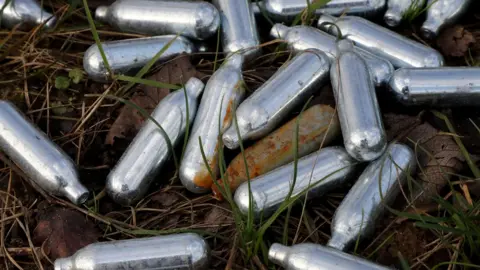Nitrous oxide: MPs approve bill to ban laughing gas possession
 PA Media
PA MediaPossessing laughing gas has moved a step closer to being made illegal, after MPs voted overwhelmingly to have it categorised as a class C drug.
Under the law change, unlawful possession of nitrous oxide will carry a sentence of up to two years in prison or a large fine.
It is one of the most commonly used recreational drugs among young people.
Critics have warned the government against arresting "your way out of a public health issue".
MPs passed the bill by 404 votes to 36, and it will now go to the House of Lords, where opposition is unexpected.
The use of nitrous oxide for medical reasons - such as during childbirth - as well as commercial purposes will still be allowed.
The substance - which is sold in metal canisters - can cause headaches and make some users anxious or paranoid, while over-use can make people faint or lose consciousness.
Intensive, frequent use can also lead to vitamin B12 deficiency which can cause neurological damage, according to a government report quoting several scientific studies.
If the law change is passed, nitrous oxide would be controlled as a class C drug under the Misuse of Drugs Act 1971, alongside diazepam, GHB and GBL.
Those found in unlawful possession of the drug could face up to two years in prison or an unlimited fine, with up to 14 years for supply or production.
Policing minister Chris Philp said neurological units had seen "extremely worrying" numbers of people who were paralysed or suffered serious consequences from using the drug.
Speaking for Labour, Alex Norris said the change in the law was relatively minor and his party would not stand in the way of it.
The Scottish National Party voted against the ban, with spokesperson Alison Thewliss describing drug use as a public health issue.
"You cannot arrest your way out of a public health issue," she said.
Health experts have also previously warned against a ban, saying it could stop users seeking medical help.
Conservative MP Dan Poulter, an NHS doctor, opposed the law change, saying that the Advisory Council on the Misuse of Drugs said they "did not believe that the medical harms of nitrous oxide posed anything near the significance of many other street drugs or indeed if we look at the harms of alcohol".
He added that a ban would achieve little except disrupting businesses that supply the gas for legitimate purposes.
Mr Philp said exemptions from the ban would be "extremely broad" to ensure the government does not "unintentionally stymie" its legitimate use for medical research or commercial purposes.
